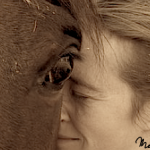To answer a question: Does vaccination routinely cause hoof sensitivity?
| September 22, 2012 | Posted by Melinda under Uncategorized |
After vaccinating Farley this year, I noticed she was much more tender over gravel. After talking with a fellow blogger and friend about the issue, I decided to see whether anything had been published in the scientific literature.
I am often amazed after talking with dog owners at dog parks or other horse owners how largely ignorant the “average” owner is. While it is not fair to brand a population with too-large of a brush, I think it is fair to say (especially in the horse world) management practices rooted in “old wives tales” tend to abound despite sometimes overwhelming evidence to the contrary.
I try to avoid being one of those average owners that takes information on faith because of a personal anecdote, or because I like/dislike the person sharing the information.
I like to make a distinction between different categories of information.
1. Information/practices proven in the scientific literature and there seems to be general consensus that “this is the way it is”. (example: horses do better if fed to mimic their natural state –> ie small meals throughout the day. )
2. Those practices/information that there is some controversy about and there is a growing body of evidence that it might be true, but objectively no one can say for sure yet (example: horses should be barefoot when they can be – as simple as pulling shoes in the winter if you aren’t riding, not necessarily the great performance barefoot horse debate).
3. Practices that there has been some research on, and is either inconclusive, mixed, or only looked at in non-horse models. (Example: Do endurance horses REALLY need higher selenium levels? How much vitamin E should be supplemented? What is the “best” way to condition for 100 miles?” What is the perfect electrolyte schedule?)
4. Practices in long use, but haven’t actually be scientifically tested (examples: treeless versus treed saddles, does feeding a specific supplement really work? don’t let a horse drink while hot, wool is the best pad, a synthetic vented pad is the best pad).
When I talk to people or write articles here, I try to be clear on which category the information I’m sharing falls into. If I believe very strongly in something, but there’s no clear evidence, or there’s some valid controversy in the literature, I try to communicate that.
Before I start talking about vaccination making my horse tenderfooted, I need to find out what kind of evidence there is. It’s a very different thing to say that I’ve noticed a trend with MY horse after vaccination, and then to say that “vaccinating can make horses hoofsore”. Or even imply that my personal circumstance *might* be true for others, without first looking to see whether there is ANY evidence that this could be true. I want EVERYONE that reads this blog to be a critical thinker, and hopefully by sharing a bit about what I learned on this topic you’ll be inspired to do a bit of your own research :).
First step
I went to Mendeley’s online library and searched using various keywords that included “horse, hoof, vaccine, vaccination, sensitivity, sore, adverse reaction etc.”
Result: I came up with one reference:
Tjälve, H. (2004). Adverse reactions to veterinary drugs reported in Sweden during 1991-1995. Svensk Veterinartidning, 20(2), 105–10. Retrieved from http://www.ncbi.nlm.nih.gov/pubmed/9131536
This isn’t a promising paper. Horses are mentioned in passing and I doubt I’ll find any good evidence either way. However it was finding this article that made me add “adverse reaction” to my search term list.
I decided that I needed to cast a wider net and I did similar searches on Google Scholar. Still nothing.
Conclusion: no obvious answer to my question in the readily available scientific literature
Second step – Find a starting point by getting more specificI googled my question “Does vaccination make horses hooves sore?” and had a bunch of unreviewed/unscientific sites pop up, mostly barefoot and laminitis related. PERFECT. I went to one that didn’t look TOO “out there” and found a page that had question/answer articles that were by veterinarians.
From this website I read this:
DR. TOM’S ANSWER:
October 24, 2004
There have been lots of examples over the past few seasons of laminitis in horses given the West Nile Vaccine. Though any vaccine can potentially cause disturbance and reaction enough in horses to lead to laminitis, the West Nile vaccine seems to have caused more than its share of problems in this regard–this may just be a statistically predictable situation due to increasing numbers of people vaccinating their horses with this vaccine. Some trimmers have reported orange-colored soles and separation of the entire white line…even the white line along the edges of the bars. This is indicative of metabolic and toxic insult rather than mechanical disruption of laminae leading to laminitis. Horses vaccinated in the neck muscle have been more severely affected than ones vaccinated in the rear leg.
Now I have some more specific questions that I can go back to the literature and search for. This vet doesn’t give any references and it’s impossible for me to tell whether he’s speaking from personal experience, studies, published literature etc.
-What is published on the adverse affects of west nile vaccine? How does it compare to the tetanus or “4 way” that is commonly given?
-Does the location of the vaccine matter for the incidence of hoof related adverse reactions?
I still won’t be able to generalize from the answers to these questions whether ALL vaccines make horses sore, but I DID give Farley a west nile, and that could explain the hoof tenderness, if what Dr. Tom says is true.
Third Step – Verify claims
I find that verifying claims in the literature is easier than going in cold turkey like I did in the first step, HOWEVER, sometimes I come across something really interesting that I would have missed if I go in with very specific questions first.
Fort Dodge doesn’t mention any hoof adverse side effects in their journal article (weakness – published by the vaccine company)
In this study out of Davis, there were no adverse reactions noted in the 155 vaccinated horses in the study (weakness – subtle foot soreness in a previously sound barefoot horse would probably go unnoticed)
There’s this that came out of the AAEP meeting that talks about vaccine controversies including west nile. The adverse effects table didn’t have west nile listed. The only specific facts about west nile in the document are:
Claimsthat the killed West Nile virus vaccinewas responsible for pre-natal fetal loss have not been substantiated
-Attributed in document to:Vest DJ, Cohen ND, Berezowski CJ, et al. Evaluation of administration of WestNile virus vaccine to pregnant broodmares. J Am Vet Med Assoc 2004;225:1894-1897.
*The document does cover topics such as where to give vaccines and apart from mentioning that certain manufactures specify where a vaccine is to be given, any link between giving a vaccine in the neck and lamness is not mentioned.
Fourth Step – Deciding how I will interpret the evidence
Without spending gobs more time on this subject, this is all I was able to find. Now I need to decide. Is there evidence out there that I can say conclusively either way? No. I could not find a study that looked at hoof changes or sensitivity changes post vaccination with any vaccine, so I cannot rule out that this is a possibility –> however there is nothing to suggest beyond anecdotal evidence that it is an issue.
Thus, my position on the link between vaccination and hoof sensitivity is that while there is no good evidence in the literature that vaccinating will cause my horse to be more tenderfooted, in my experience there was a noticeable difference that I could not explain any other way.
I’m open to ammending my statement above if anyone has any evidence to add that I missed!












My vet instructed me to give a shot of banamine when vaccinating to counteract any fever that may be caused by the vaccine. I’ve had many friends that have had their horses come up footsore and/or grow out fever rings following vaccinations.
Interesting!
I encourage my students to vaccinate their horses against tetanus and strangles (we can get it as a 2in1 vaccine) each year but advise that they don’t need to do tetanus vaccinations on an annual basis.
However, sometimes it’s easier to do it each year rather than go, is this year the one where I should give a tetanus vaccination?
Thanks for detailing your search and what you look for – pity you weren’t able to find more in published papers!
I, too, have wondered about the reasons for vaccinating horses so frequently. Unfortunately, if one keeps their horse in a group boarding situation, there may not be much choice in the matter. If I had my own place, I would definitely do my research and consider cutting back on the vaccination schedule. I have not noticed foot tenderness.
I did some similar searching when a friend recently mentioned that feeding diatomaceous earth to horses for fly larval control was dangerous, because it would cut up their blood vessels. After lots of searching, I could not find anything legitimate that supported that hypothesis. The major misunderstanding was that the diatomaceous earth does not leave the digestive system and only works on larva that may be laid in the manure. I could not find any literature to support that the sediment injures the digestive tract, but did find that horses may extract some calcium from the calcium carbonate-based earth.
I find the whole vaccine protocol whether animal or human is fraught with the “do it the way we (experts) tell you, because we say so.”
Why do we get 1 tetanus every 10 years, but for horses it’s every year? Why do puppies and kittens get vaccinated every two weeks until weaned because the antibodies in the mother’s milk interfere with the immune response but for human babies this is ignored? (I asked the pediatrician the same question and got a shrug in response.)
Sharlene